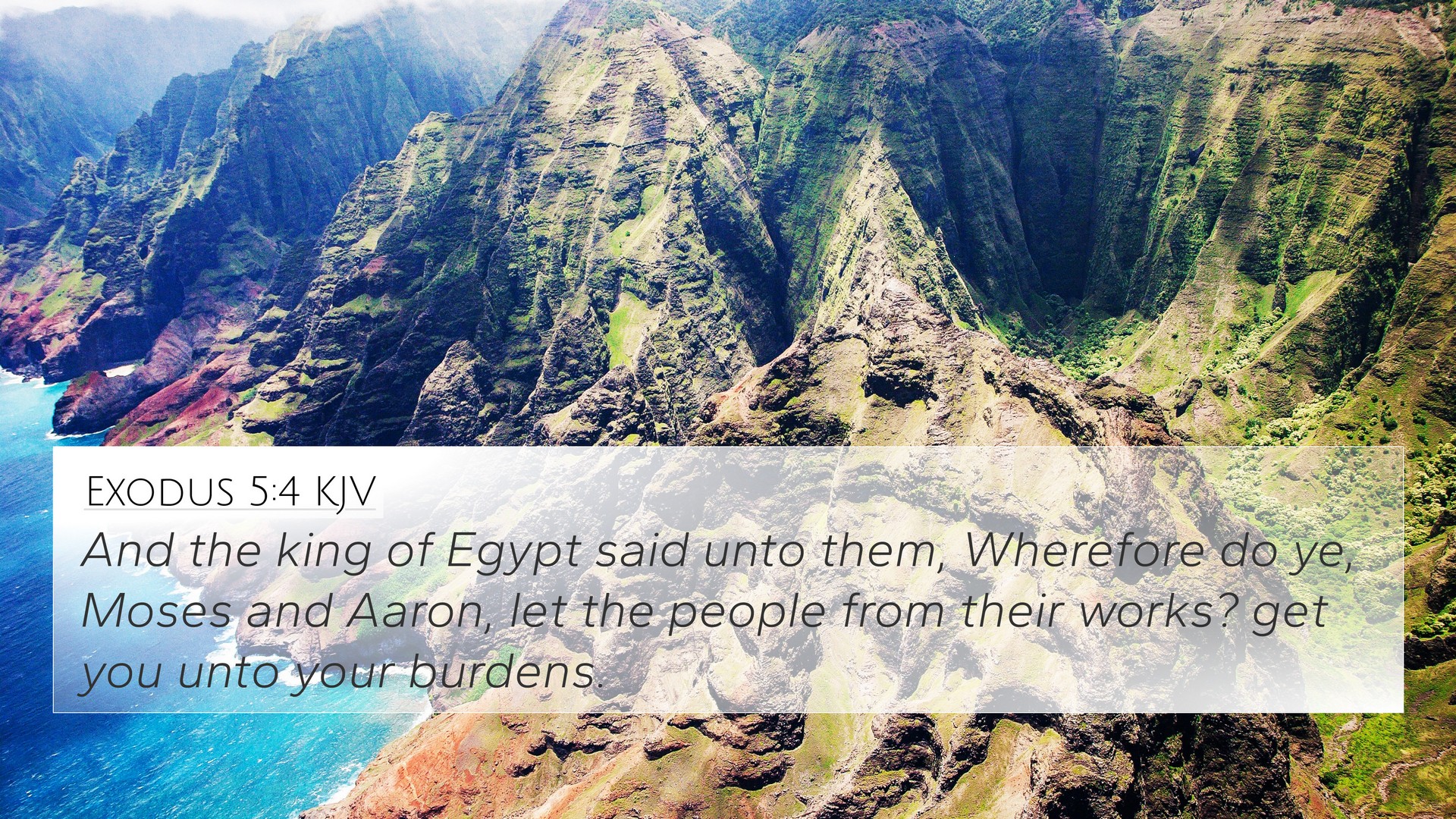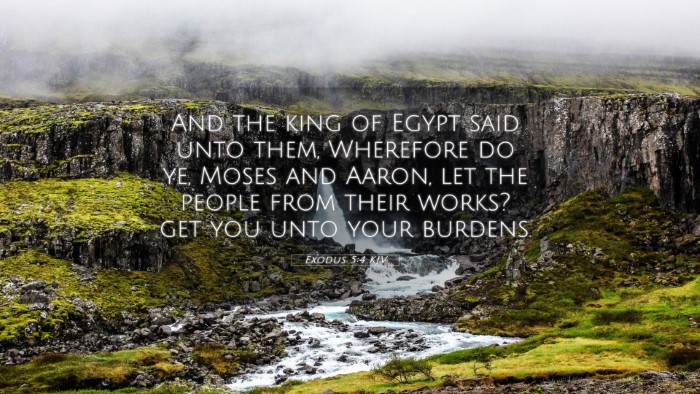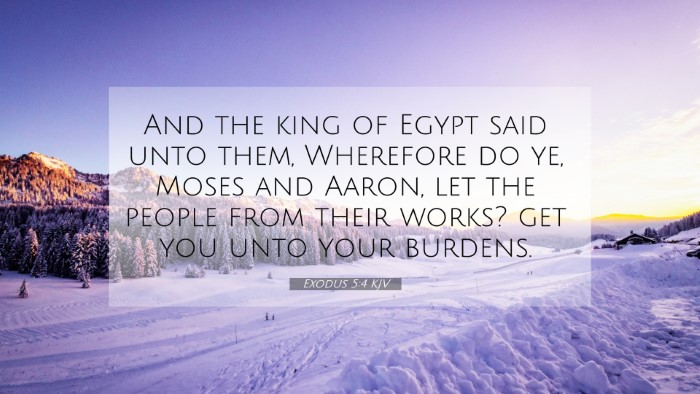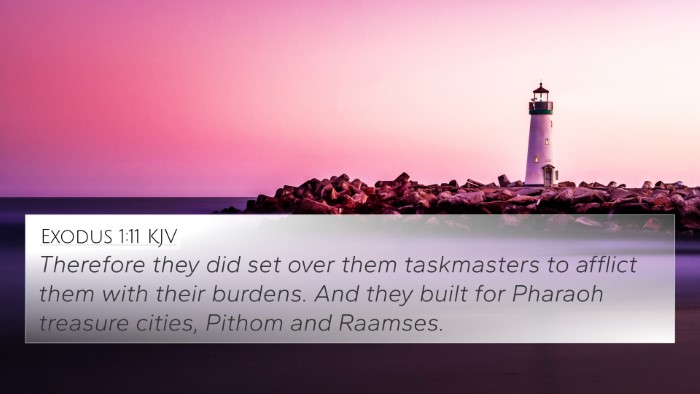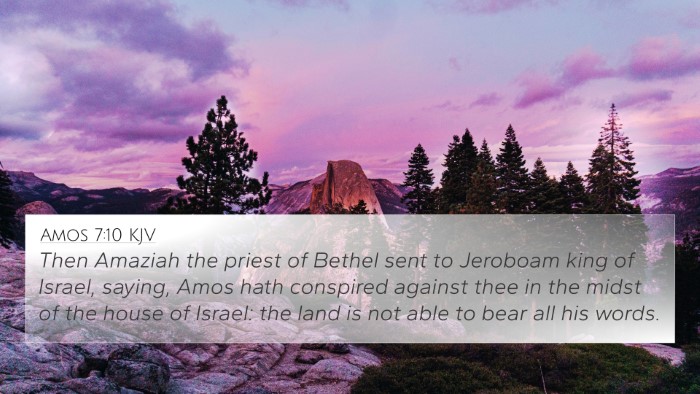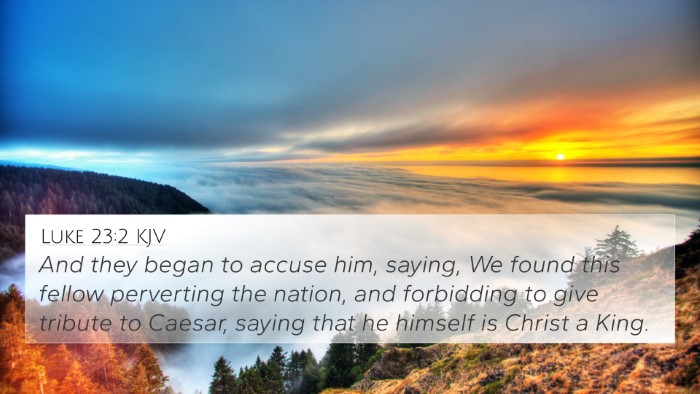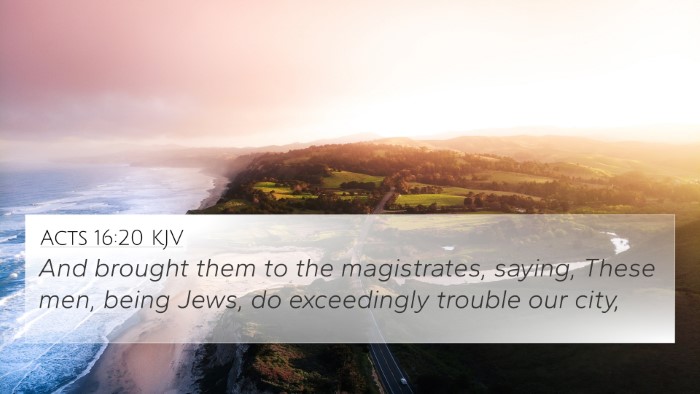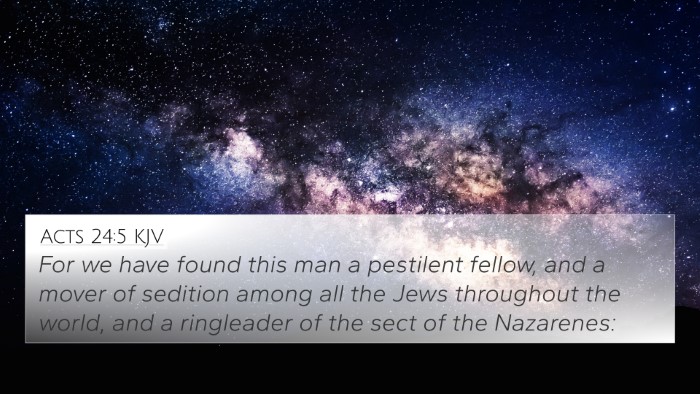Understanding Exodus 5:4
Exodus 5:4 states: "And the king of Egypt said unto them, Wherefore do ye, Moses and Aaron, let the people from their works? get you unto your burdens." This verse is pivotal in the narrative of Exodus, where Moses and Aaron confront Pharaoh to demand the release of the Israelites from slavery. The reply of Pharaoh encapsulates his resistance and the oppression faced by the Israelites.
Summary of Insights
The responses of Pharaoh reveal several key themes and meanings within this verse, as highlighted by public domain commentaries.
- Pharaoh's Authority: Pharaoh's question indicates his belief in absolute authority, questioning why Moses and Aaron would disrupt the labor of the Israelites. Matthew Henry notes that Pharaoh's disdain for the request reveals the pride and hardness of the Egyptian king.
- Oppression of Israel: The verse illustrates the burden placed on the Israelites. Albert Barnes elaborates on the harsh reality of their servitude, pointing out the increased burdens imposed by Pharaoh as a response to their request for freedom.
- Spiritual Significance: Adam Clarke emphasizes that Moses’ request to Pharaoh is symbolic of the greater spiritual deliverance sought by God for His people, reflecting their need for liberation not only from physical labor but also from sin.
- Confrontation between God’s Mission and Human Authority: This encounter represents the clash between divine instruction and human opposition. Notably, Clarke mentions that this forms a significant backdrop to the subsequent displays of God’s power through plagues.
- Resistance to God’s Plan: The request made by Moses and Aaron is an act of faith, which is met with hostility. Matthew Henry highlights that every act of faith may be resisted by the world as it challenges the status quo.
Cross-References and Connections
Exodus 5:4 can be viewed in conjunction with several other biblical verses that deepen its understanding:
- Exodus 3:10: The initial call to Moses to confront Pharaoh and lead the Israelites out of bondage.
- Exodus 6:1: God’s assurance to Moses about Pharaoh’s eventual compliance after demonstrating His power.
- Exodus 14:21-31: The ultimate deliverance of the Israelites through the parting of the Red Sea, showcasing God’s ability to overcome human authority.
- Romans 9:17: Paul cites Pharaoh as an example of God raising up leaders for His purpose, indicating divine sovereignty in opposition.
- Hebrews 11:23-29: The faith of Moses, illustrating the significance of leaving Egypt, which echoes this confrontation.
- Isaiah 53:7: A prophetic reference to Christ, paralleling the oppression faced by the Savior with that of the Israelites.
- Revelation 16:10-11: The judgment on those who oppose God’s people, reminiscent of Pharaoh's hard heart.
- Genesis 15:13-14: God’s prophecy about Israel's time in Egypt and the judgment on their oppressors.
- 2 Timothy 3:8: Refers to Jannes and Jambres opposing Moses, symbolizing the resistance of evil to God’s truth.
- Matthew 5:10-12: The encouragement for believers who are persecuted for righteousness, paralleling the struggles of the Israelites under Pharaoh.
Thematic Analysis
The themes present in Exodus 5:4 resonate throughout the entire Bible, particularly in discussions about:
- Faith vs. Oppression: The perpetual struggle of God’s people against worldly authority aims to isolate and oppose the faithful.
- Divine Sovereignty: God’s overarching plans and purposes through human history, often using moments of confrontation to demonstrate His power.
- Redemption: The quest for liberation from sin and physical bondage mirrors the spiritual journey of believers today.
Practical Applications
This verse and its insights challenge readers to reflect on their own lives in terms of faith and perseverance under stress:
- Encouragement in Trials: Just as Moses faced adversity, believers are encouraged to remain steadfast in their faith when confronting challenges.
- Understanding Authority: The dynamics of power in our lives should be viewed through the lens of God’s ultimate authority and purpose.
- Activism in Faith: Believers are called to act upon their faith, as Moses and Aaron did, advocating for justice and righteousness.
Conclusion
Exodus 5:4 serves as a foundational verse in understanding the struggles between divine mandate and earthly powers. Through the insights drawn from respected commentaries and the connected biblical texts, readers are reminded of the importance of faith in the face of challenges and the ongoing relevance of these themes throughout Scripture.
This examination encourages a deeper exploration of the connections between Bible verses and the stories they tell. For those studying the Scriptures, this verse exemplifies the necessity of tools for Bible cross-referencing and provides a framework for understanding how different parts of the Bible relate to overarching themes of faith, oppression, and God’s sovereignty.
